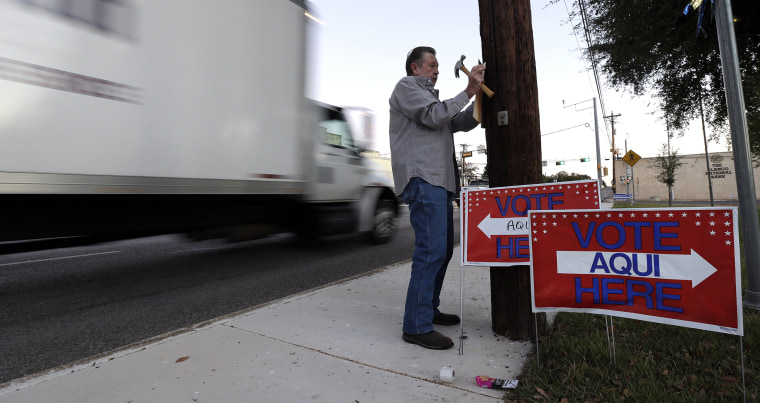Jim Wright was once the speaker of the U.S. House, and third in line to the presidency. But Texas’ strict voter ID law nearly prevented him from casting a vote this year.
With several major elections and numerous lower-profile races scheduled for Tuesday, Wright’s difficulties are the latest sign that, a year after President Obama pledged to fix America’s broken voting system, it’s more dysfunctional than ever.
Wright, 90, has voted every year since 1944. But he realized last week that his driver’s license had expired. Wright has a faculty ID from Texas Christian University, where he teaches political science, but Texas’s voting law doesn’t accept university IDs. So he went Saturday to a government office to get a state ID card. But he was told he’d need to come back Monday with a certified copy of his birth certificate.
Wright told msnbc that he was finally able to get his ID on Monday. But he worries about others who may not be able to take as much time. "I think you become a bit discouraged and dismayed and confused, and throw up your hands and say, 'I'm not going to vote,’" said Wright, a Democrat who served as Speaker in the 1980s and was one of a minority of Texas congressmen who voted for the 1965 Voting Rights Act.
In fact, Wright said he thinks dissuading voters is the point of the law. "I do believe that there's an apprehension on their part, unreasonably so, of too many people voting. I hate to say that."
Wright’s struggles are hardly unique. Obama’s election night promise last year—“we’re gonna fix that!”—was a reaction to long lines in Florida and elsewhere that forced some voters to wait eight hours or more. Earlier this year, Obama created a commission to look into the problem. But since then, it’s become even clearer that the most urgent threats to voting are the result of deliberate Republican efforts to make voting more difficult, especially for poor and minority voters who lean Democratic. Those efforts got a massive boost in June when the Supreme Court struck down a key part of the Voting Rights Act, making it easier for some states to impose voting restrictions without pushback from the federal government. In some places, Tuesday’s elections will be the first test of their impact.
Texas’ controversial voter ID law is the highest-profile example. Passed in 2011, it was blocked last year by a federal court under the Voting Rights Act. But thanks to the Supreme Court’s weakening of the Voting Rights Act, the law is now in effect for the first time—though the Justice Department is still challenging it. And in early voting so far, it’s not going well.
Several state constitutional amendments are on the ballot, and both leading candidates for governor next year, Democrat Wendy Davis and Republican Greg Abbott, have been required to sign affidavits in order to vote. That’s what the law requires if there’s even a slight mismatch between the name listed on a voter’s ID and the one on the rolls—a problem that married or divorced women are disproportionately likely to encounter. As of Friday, more than one in seven early voters in Dallas County had been forced to sign an affidavit to cast a ballot. The law’s real test will come Tuesday—Election Day itself—when turnout is likely to rise.
Like the Texas law, South Carolina’s own strict voter ID measure also was blocked by the federal government under the Voting Rights Act, when the Feds had the power to do so. And also like the Texas law, it too will be in effect for the first time this year. There’s a mayoral election in Columbia, the state’s biggest city, as well as city council elections in Charleston and Greenville. Nearly 82,000 minority citizens in the state were registered to vote but lacked the ID required by the law, according to state data cited in court last year. How many of those voters will be turned away?
Virginia, too—one of just two states electing its governor this year—is in the spotlight. Virginia’s own voter ID law, passed in the wake of the Supreme Court ruling, won’t go into effect until 2014. But separately, the state has conducted a rushed purge that as of Oct. 17 had removed nearly 40,000 names from the voter rolls. After several eligible voters were wrongly removed, Democrats tried unsuccessfully to have a court stop the purge. Adding to concerns, the effort was defended in court by Attorney General Ken Cuccinelli, the GOP’s candidate for governor.
The next few years promise to present even greater challenges to voters. Photo ID laws in Mississippi and Alabama will go into effect in 2014, and North Carolina’s—the subject of a federal lawsuit—in 2016.
Nor is it just the South where there’s cause for concern. A Wisconsin photo ID law is the subject of a lawsuit, and has not yet gone into effect. But in Pennsylvania, where the same situation applies, the state is nonetheless running a public information campaign telling voters to “Show It,” just as it did before last November’s election. Democrats and voting rights advocates say the ads are confusing and misleading, potentially giving voters the impression that photo ID is required.
“The last thing voters need now is more confusion about the process and what they should bring to the polls to vote,” Sen. Jay Costa told reporters last month.
As for President Obama’s election commission, it’s still holding hearings and compiling information for a report to be released next year offering non-binding recommendations to reduce lines and make the voting process run more smoothly. But if it really wants to fix America’s voting problems, it’ll have a lot more work to do.
